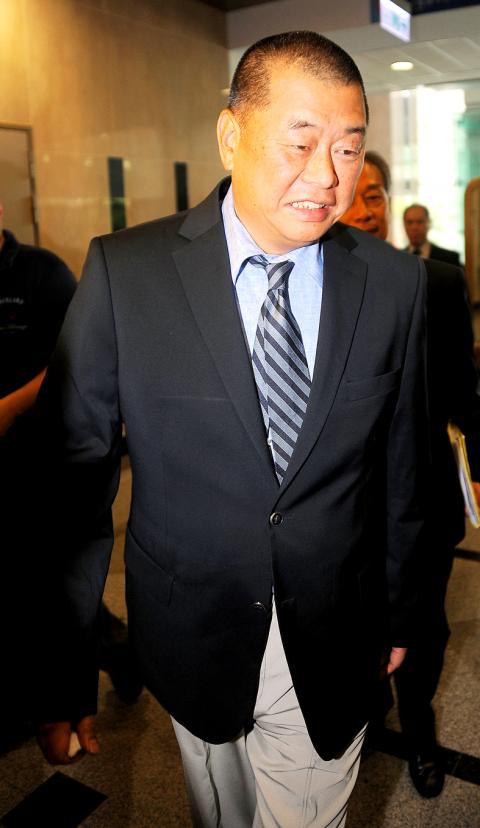Anticorruption officers in Hong Kong yesterday raided the home of Jimmy Lai (黎智英), a media magnate and outspoken critic of Beijing who has supported pro-democracy activists through his publications and with donations.
Hong Kong has been deeply polarized and hit by protests over how its next leader is to be chosen in 2017 — by universal suffrage, as pro-democracy campaigners want, or from a list of pro-Beijing candidates.
The raid on Lai’s home in an affluent avenue in Kowloon District came after media reports on Wednesday said China had decided to limit nominations for the 2017 election to a handful of candidates loyal to Beijing, which will likely escalate protests by pro-democracy activists.

Photo: Taipei Times
“The timing is not uncoincidental with [this week’s move] in our opinion. If you wanted to cool things down, this is the last thing you would do,” Lai’s top aide and spokesman Mark Simon said.
China’s National People’s Congress is expected to announce its decision on Hong Kong’s future on Sunday.
Simon said five anti-graft officials had also searched his home.
The territory’s Independent Commission Against Corruption (ICAC) said later in a statement it had searched three residences and the office of a lawmaker as part of a bribery investigation.
It said it also served a “statutory notice” to the secretary-general of a political party. It did not identify the people or the party, and said no arrests had been made.
Lai owns Hong Kong-based media company Next Media Ltd (壹傳媒), which publishes Next Magazine and the Apple Daily newspaper.
Lai spoke briefly to reporters outside his home after the raid, confirming that ICAC officials had left, but he declined to elaborate.
Trade in Next Media Ltd was halted after the stock fell as much as 6 percent.
This month, e-mails leaked to Hong Kong newspapers gave details of payments that Lai made to the pro-democracy Occupy Central movement.
The group has threatened to shut down Hong Kong’s financial district with protests if Beijing does not allow the 2017 election to be fully democratic. It is not illegal in Hong Kong to receive political donations.
The Apple Daily reported that anti-graft officers had also visited the home of Labour Party lawmaker Lee Cheuk-yan (李卓人) yesterday and removed bank documents. Lee was among activists arrested on July 2 at a protest billed as a rehearsal for the Occupy Central movement.
A copy of a search warrant seen by Reuters gave permission for the ICAC to look for items including bank and electronic records related to payments or donations made by Lai to Labour Party officials, including Lee.
This year, Next Media said HSBC Holdings and Standard Chartered had pulled millions of dollars worth of advertisements from Apple Daily after they were pressured by Beijing.
HSBC and Standard Chartered said the decision to pull the advertising was for commercial reasons.
In July last year, Apple Daily said tens of thousands of copies of two editions of the newspaper had been torched by masked men at distribution points.
Lai’s home was also rammed by a car and the assailants left a machete, an axe and a threatening message in the driveway, it said.

The Central Election Commission has amended election and recall regulations to require elected office candidates to provide proof that they have no Chinese citizenship, a Cabinet report said. The commission on Oct. 29 last year revised the Measures for the Permission of Family-based Residence, Long-term Residence and Settlement of People from the Mainland Area in the Taiwan Area (大陸地區人民在台灣地區依親居留長期居留或定居許可辦法), the Executive Yuan said in a report it submitted to the legislature for review. The revision requires Chinese citizens applying for permanent residency to submit notarial documents showing that they have lost their Chinese household record and have renounced — or have never

A magnitude 5.6 earthquake struck off the coast of Yilan County at 12:37pm today, with clear shaking felt across much of northern Taiwan. There were no immediate reports of damage. The epicenter of the quake was 16.9km east-southeast of Yilan County Hall offshore at a depth of 66.8km, Central Weather Administration (CWA) data showed. The maximum intensity registered at a 4 in Yilan County’s Nanao Township (南澳) on Taiwan’s seven-tier scale. Other parts of Yilan, as well as certain areas of Hualien County, Taipei, New Taipei City, Taoyuan, Hsinchu County, Taichung and Miaoli County, recorded intensities of 3. Residents of Yilan County and Taipei received

Taiwan has secured another breakthrough in fruit exports, with jujubes, dragon fruit and lychees approved for shipment to the EU, the Ministry of Agriculture said yesterday. The Animal and Plant Health Inspection Agency on Thursday received formal notification of the approval from the EU, the ministry said, adding that the decision was expected to expand Taiwanese fruit producers’ access to high-end European markets. Taiwan exported 126 tonnes of lychees last year, valued at US$1.48 million, with Japan accounting for 102 tonnes. Other export destinations included New Zealand, Hong Kong, the US and Australia, ministry data showed. Jujube exports totaled 103 tonnes, valued at

BIG SPENDERS: Foreign investors bought the most Taiwan equities since 2005, signaling confidence that an AI boom would continue to benefit chipmakers Taiwan Semiconductor Manufacturing Co’s (TSMC, 台積電) market capitalization swelled to US$2 trillion for the first time following a 4.25 percent rally in its American depositary receipts (ADR) overnight, putting the world’s biggest contract chipmaker sixth on the list of the world’s biggest companies by market capitalization, just behind Amazon.com Inc. The site CompaniesMarketcap.com ranked TSMC ahead of Saudi Aramco and Meta Platforms Inc. The Taiwanese company’s ADRs on Tuesday surged to US$385.75 on the New York Stock Exchange, as strong demand for artificial intelligence (AI) applications led to chip supply constraints and boost revenue growth to record-breaking levels. Each TSMC ADR represents